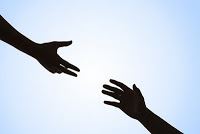We are usually rather good at leading our lives. We are happy, or at least content, most of the time. When times are tough we can often find ways to get through, building on our own strengths and the support of those around us.
But sometimes life gets so difficult that our life hungry stupidity starts to fade. Our ordinary magic and personal medicine aren’t enough. Our coping skills are snowed under. Our well being recipes are insufficient. We could do with some extra help.
One of the problems with giving advice on self-help (as I’ve done so far in this blog), is that it can seem to imply that we shouldn’t look elsewhere for help. ‘I must deal with this,’ we tell ourselves. ‘If I can’t then it’s a sign of weakness, it just shows what a wimp I am’. We start shouting at ourselves: ‘Stand on your own two feet’. ‘Just get on with it.’ ‘Don’t trouble the doctor, she’s too busy with people who are really sick.’
 Sometimes we are overwhelmed by troubles. Some times are so tough that we can’t see any way out. We need to be able to reach out to someone with authority, someone with expertise or skill, and say ‘I can't do this by myself. Please, lend me a hand’.
Sometimes we are overwhelmed by troubles. Some times are so tough that we can’t see any way out. We need to be able to reach out to someone with authority, someone with expertise or skill, and say ‘I can't do this by myself. Please, lend me a hand’.
And that is OK. In fact it is more than OK. It is fine. As human beings, as persons, as citizens, we are entitled. We deserve help. We have the right to reach out.
That depends on who has the ability to help us solve our particular problems. It could be a doctor, a psychologist, a lawyer, a priest, an Imam, or maybe a trade union official, or a good plumber. Sometimes our choice will be affected by whether we need (and can afford) to pay.
Most important of all, reaching out depends on who we can trust.
‘A lot of my problems go back to childhood’, Sarah told me. ‘I was sexually abused as a child, by a friend of the family. My mother did nothing to protect me. Dad died when I was fifteen. I became anorexic. I just couldn’t deal with it all.’ She had ECT, drugs, the lot. Nothing worked. Eventually she met Adele, a psychologist who helped her work through a lot of her problems. ‘I could trust Adele’.
So when things went wrong again, she had to decide who’d be best to help.
‘In January I was upset’, said Sarah. ‘I thought shall I go to the doctors - or shall I go to the health centre to see if Adele’s there? It's not like it was a physical problem, or a medical emergency, maybe the doctors wouldn’t think they had time to deal with a problem like this. I felt they wouldn't have taken my distress seriously enough. It goes back to past experiences – ‘there's nothing the matter with you, go home and take a Valium’, being fobbed off. At that time I was feeling very vulnerable, so I plumped for Adele as the one with the better chance of getting my needs met. Also it meant I could maintain some control over the situation’.
Sarah has it exactly right. When we are reaching out for help, it’s risky. We need somebody competent, but it’s also got to be somebody we can trust. Trust that we’ll be taken seriously, that we’ll get our needs met, and that we can keep some control.